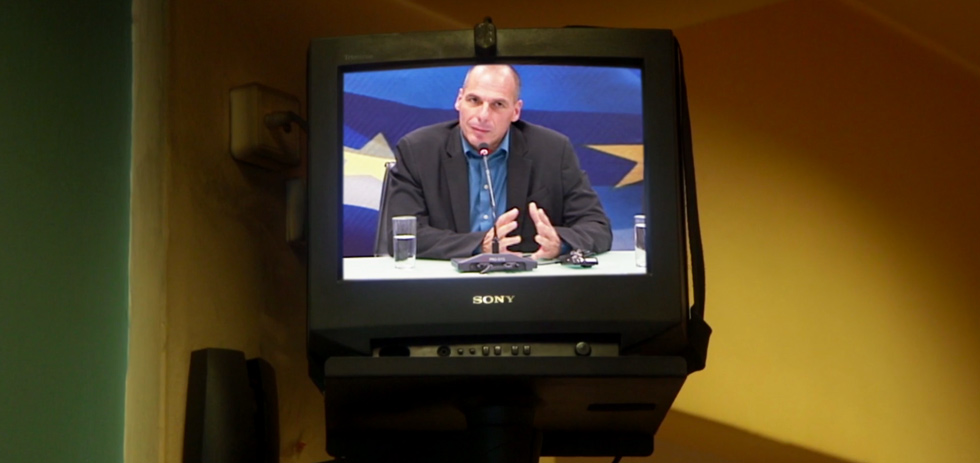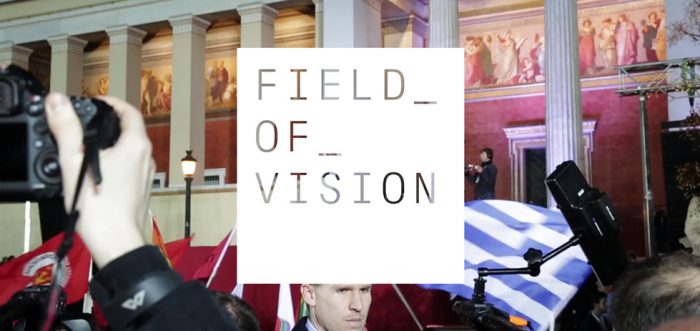Over the coming months our column We Like Shorts, Shorts will play host to a series of pieces about the new short documentary series Field of Vision, hosted over at The Intercept and co-created by Laura Poitras, AJ Schnack and Charlotte Cook.
The shorts within The Intercept’s Field of Vision series, on the whole, have sought to apply greater scrutiny to ongoing issues across the globe. In Paul Mason’s #ThisIsACoup – which takes its name from a Twitter hashtag in July 2015 – there’s a certain break from the creative process carried throughout the majority of the other shorts in the aforementioned series. That is, Mason’s work is focusing on one of the biggest international stories of the last few years; a period that has been covered and analysed extensively, as one of the most malleable case studies for economic, social and political theories. This context gives some justification for Mason’s work playing out in four acts (easily the longest in the Field of Vision series). At the same time, it prompts a questioning of just how insightful such a work can really be around a topic covered in such an extensive and thorough manner in the last year.
To Mason’s credit, he makes it clear from the inception that this isn’t his intention – #ThisIsACoup is instead, a comprehensive introduction and primer to the crisis. Opening on the election of Syriza and the declaration of “economic warfare”, the four parts trace the rise and fall of the sense of hope and resistance in Greece’s political climate – with the titles of each section giving a fairly strong indication of the shifts in the country’s national mood over time: “Angela, suck our balls”, “To pay or not to pay”, “Οχι: the Greek word for ‘no'”, and “Surrender or die.” Within the opening 10 minutes the crisis is framed as “Greek democracy vs. the Eurozone”, yet with the timeline of the crisis already relatively known, there’s a more humanistic survey that takes place.
To its credit #ThisIsACoup operates on several specific levels. As a political case study, it offers a clear refutation of the way in which the Eurozone is run. It looks at the degree of hope and optimism present in the Greek people, through frequent talking head interviews. Mason traverses the docks at Piraeus, theatres, and squats; with these interviewees throughout the work mapping an initial portrait of the crisis defined by hope and defiance. Mason goes on to contrast this growing trend of hope and optimism, both in the population and political sphere, with the lack of malleability on the other end – in the leaders of the Eurogroup, the IMF, and the Eurozone. What emerges is a stark portrayal of the contrast between the relative powerlessness of Greece (within the Eurozone system) and the sheer influence of its creditors. #ThisIsACoup distinguishes itself in some capacity through these anecdotes and conversations, as a more humanistic and less economic analysis of the crisis; focused extensively on the social impacts – as well as the political structures.
Mason’s access to Syriza’s politicians is extensive, with his continued conversations with Tsipras, Varoufakis and Parliament Speaker (at the time) Zoe Konstantopolou showing the gradual shifts in how each politician views the crisis. At one point Konstantopolou’s says “if Europe is meant to be about human beings, and ceases to be that, it isn’t Europe”. It’s this idea that Mason so effectively captures, with his penchant for intimacy with his subjects giving these shorts an edge on a vast majority of reporting on the crisis.

Despite this, we’re put in a strange position as an audience. We’re given much more information about the set topic issue than in other Field of Vision Shorts, yet there’s an odd distancing through its form. It doesn’t fit in with the style that defines the majority of the shorts, and, though it doesn’t have a run-time equivalent to a feature-length documentary, by the end of the 4-parts, it’s clear that it should. There’s an attention to detail so frequently cut short by adhering to the length of the short film form. It’s so palpably clear by the conclusion that this an issue – from both a political, economic and humanistic angle – that a 2-hour documentary form would have served the story better.
All in all, it remains an incomplete but fascinating look at a brief section of the ongoing Greek crisis. While it tries to submerge itself in the Greek psyche more than the majority of reporting on the issue, it asks more questions than its format gives it time to answer. #ThisIsACoup is the longest piece in the Field of Vision selection, but at the same time, in moving beyond the 15 minute confines of the other works, Mason leaves behind the succinctness that defines much of the series. At the same time, he creates an appetite for detail and breadth, that isn’t satiated in the four part work he delivers. Whilst, all in all, #ThisIsACoup is a solid primer into the Greek Crisis, the work highlights the lack of depth in a lot reporting around the events, before failing to have enough time to properly address it.
